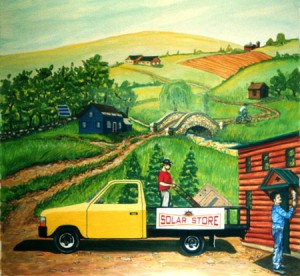Dave Bonta hasn’t paid an electric bill in 12 years. He has no heating bill, either.
 That’s because he kicked his 40 kilowatt/hr electricity habit in the 1990s and used solar electricity to fill the gap. “I learned to live on less,” he told an audience at RiverRun bookstore the other night. “Surprise, I made it to one kilowatt. It wasn’t hard…. It’s kind of nice to think we can throw our electric bills away. It’s kind of empowering.”
That’s because he kicked his 40 kilowatt/hr electricity habit in the 1990s and used solar electricity to fill the gap. “I learned to live on less,” he told an audience at RiverRun bookstore the other night. “Surprise, I made it to one kilowatt. It wasn’t hard…. It’s kind of nice to think we can throw our electric bills away. It’s kind of empowering.”
To reduce his power usage, Bonta – who has since co-authored the “The New Solar Home” and created the USA Solar Store chain – replaced light bulbs, got an energy-efficient washing machine, switched from a vacuum cleaner to a broom, and tossed the electric toothbrushes. “Anything that could be done with human power we did.” Even the press he used in his printing business was human-powered. He pedaled it.
Once he’d shrunk his energy footprint, he installed a small-scale solar electricity system in his rustic Vermont home. Printing customers immediately peppered him with questions about his set-up. That’s when the light bulb went off. He could sell this stuff, along with the know-how. Which is exactly what USA Solar Stores do, and the chain now has 27 stores in 11 states. It’s “about to grow like wildfire,” he says earnestly.
Bonta models his stores after the crunchy old Gateway stores, where the PCs were displayed on barnboard tables and salespeople didn’t bug you till you had a question. At USA Solar Stores, you can get anything from a conversation to a compact fluorescent light bulb to a full-fledged solar electricity setup. Or you can come in, look and leave. No worries. In any case, Bonta’s team is eager to address what he calls the three solar bogey men: expense, viability, aesthetics.
Bogey Man #1: Solar electricity is too expensive. Bonta will look at your current electric bill, figure in current incentives, find ways to reduce your demand, and show you how long it will take to pay off your gear. Even if the incentives disappear, he says, it’s still a good deal. The joy of sticking it to the man? Priceless.
Bogey Man #2: It doesn’t work too well. Wrong, he says.There’s a myth that if you wait, solar technology will get less expensive and super technology will come along. “The way it is now is pretty good. The technology is there, and the only thing missing is people who will try it.”
Bogey Man #3: It’s ugly. No, Bonta says, solar is becoming increasingly “building integrated” – where it’s embedded in your roof, not tacked on like an afterthought. And you don’t need it on your house at all. Bonta’s panels are on his shed, which gets better light anyway. The homes in his book are of jaw-dropping beauty.
Bonta is a softspoken guy. Although he has the conviction of a preacher, he has the slickness of, well, the guy who melted down in his first speech to the Rotary. But in the bookstore, once he warmed up you could tell he will not be denied: “Everything we can do to get our country on a sustainable path, we’re going to do.” If not, he says, generations will hold us accountable for the demise of the world’s ecology. “We can either explain it to them from a wheelchair, or fix it now.”